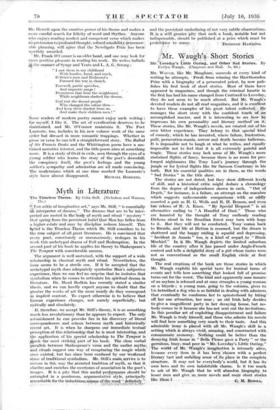Mroveday's Little Outing, and Other Sad Stories. By Evelyn Waugh.
(Chapman and Hall. 7s. 6d.)
"Mr. Waugh'is'L Shaft Stories -
MR. WAUGH, like Mi. Maugham; succeeds at every kind of
writing he attempts. ......Fresh from winning the.Havrthornden Prize with a biography of a persecuted priest, hg now pub-
lishes his first bnok of short stories. Most of them have appeared in :magazines,' and though the Criminal lunatic in the first has had his name changed from Cruttwell to Loveday, they do not seem to-be much altered. But Mr. Waugh's devoted readers. do not all read magazines, and it is excellent to have these examples of his great talent collected. Hp manages the short story with the confident touch of an accomplished master, and it is interesting to see how he impresses his own personality and literary triethod. on it. These stories, like Mr. Waugh's novels, are created out of his own bitter experience. They belong to that special kind of comedy, which he has invented, where failure, frustration, guilt, persecution-mania; sorrow and death-becOrne ludierbus. It is impossible not to laugh at what he writes, and equally impossible not to feel that it is all extremely painful and tragic. These stories may lack some of Mr. Waugh's more sustained flights of fancy, because there is no room for pro- longed nightmares like Tony Last's journey through the jungle or for lyrical flights like Sir Samson Courtenay in his bath. But his essential qualities are in them, as the words " Sad Stories" in the title show.
The stories are not dated, but they show different levels of skill, and a historical critic might deduce a chronology from the degree of independence shown in each, "Out of Depth," for instance, is a failure, an attempt on the macabre which suggests unfavourable comparisons .with s6 oddly assorted a pair as H. G. Wells and R. H. Benson, and even
échbe Of It -A-. Knox. ." By Special -Request " is an alternative ending to "A Handful of Dust." Those who are haunted by the thought of Tony endlessly reading Dickens aloud in the Brazilian forest may turn with hope to it. But they will not be comforted. -Tony -coniea back to Brenda, and life at Hetton is resumed, but the dream is shattered and the happy 'ending is squalid and depressing. "Incident in Azania " too, is a kind of seqqc.j..to ," Black Mischief." In a Mr. Waugh depicts the limited suburban, life of the country after it has passed under Anglo-French. control and tells a delightful, Story of a girl whose tastes werei not so conventional as the small English ;circle at first thought.
The real creations of the book are those stories in which
„ •. Mr. Waugh exploita his speial taste for ironical turns of events and tells how something that looked full of promise turns out for the worst. The kind and apparently sane inmate; of an asylum is released and at once strangles a young woman. on a bicycle ; a young man, going to the colonies, gives to
• his betrothed a dog who is so faithful in dealing with admirers, that eventually he condemns her to spinsterhood by biting' off her one attraction, her nose ; an old Irish lady decides to give a magnificent party in her decaying house, but no- body comes to it because she has not sent out the invitations. In this peculiar art of exploiting disappointment and failure Mr. Waugh is truly himself, and those who admire his novels will find here something very much to their taste. And this admirable irony is placed with all Mr. Waugh's skill in a setting which is always vivid, amusing, and constructed with. consummate economy. Nothing could be better than the decaying Irish house in ” Bella Fleace gave a Party" or the garrulous, busy,. mad peer in " Mr.:Loyeday's Little Outing." The wolid- of Mr. 1Vatigh's imagination is intensely alive, because every item in it has been chosen with a perfect' literary tact and unfailing sense of its place in the complete, structure. It may not be everybody's world, but it has its • own laws and its own indubitable charm. Is it too much to ask of Mr. Waugh that he will abitiulon:.hiography; :to lesser men and give, us, more novels and more short stories










































 Previous page
Previous page